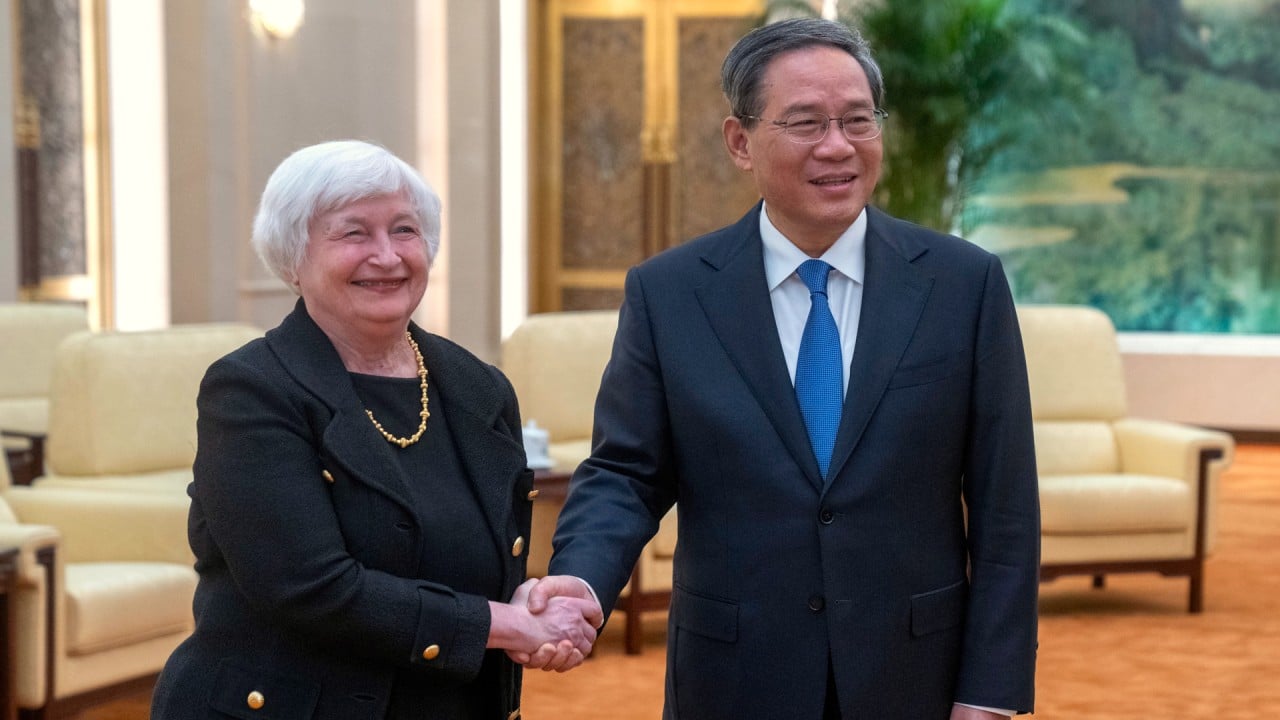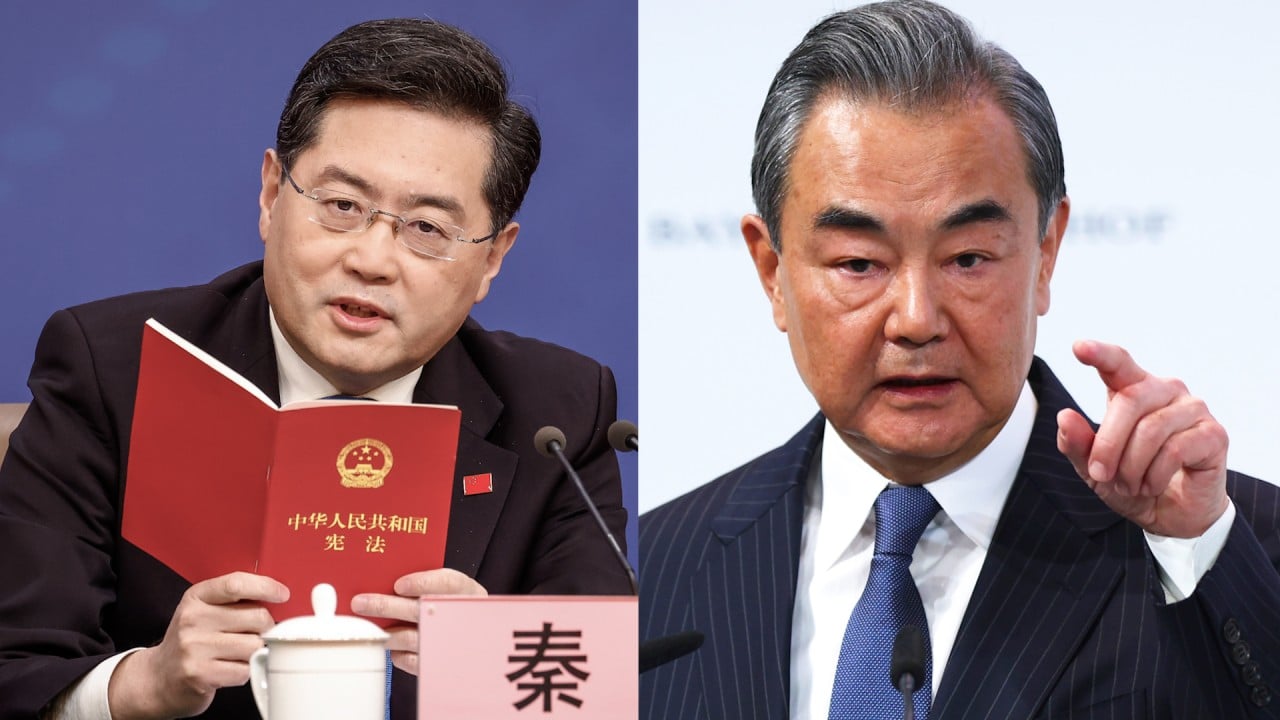
Global Impact: what have the visits to Beijing by Yellen, Blinken, Kerry and Kissinger done for US-China relations?
- Global Impact is a weekly curated newsletter featuring a news topic originating in China with a significant macro impact for our newsreaders around the world
- In this edition, we look at the host of US officials who have made the trip to China recently, and consider what progress, if any, that has been made in the tense area of US-China relations
When it comes to exchanges between the United States and China, we’ve all probably got used to their tough talk and fiery rebuttals.
But over the past weeks – even as the rival superpowers remain at loggerheads over a range of issues – it was more about the handshakes and “candid” talks as both sides look towards mending frayed ties.
While both took the chance to air their concerns and advance their interests, foreign policy observers said the meeting was still useful for reviving communications and rebuilding trust between the two nations.
“China is willing to strengthen dialogue and communication with the United States, discuss mutually beneficial cooperation, and jointly address climate change,” Wang said, in an indication that tensions were slightly easing.
“There are a lot of things that we very clearly agreed on after all this time. But there are also some issues that are going to have to be resolved that are going to take a little more time,” he said.
Kerry wants China to speed up its decarbonisation efforts, but “Xi is not going to want to give any indication that the US can pressure China”, said Scott Moore, director of the Global China Programme at the University of Pennsylvania.
Kerry did not meet the Chinese leader, but another former US secretary of state, Henry Kissinger, did.
We never forget our old friends, nor your historic contributions to promoting the growth of China-US relations and enhancing friendship between the two peoples
There is much to watch in the coming weeks, as it appears that top-level engagement between the US and China is getting back on track.
60-Second Catch-up
Deep dives

Chinese foreign minister exit: no change to Wolf Warrior diplomacy as Wang Yi replaces Qin Gang, but there is hope of policy stability
-
Qin Gang’s abrupt ousting means foreign diplomats will once again be dealing with someone who is seen in Europe as ‘a known quantity, but not liked very much’
-
But in many parts of the world, there is a sense that personnel changes will not have a significant impact on the direction of Beijing’s policies
They said Wang Yi, Qin’s predecessor who has been parachuted back into the job, will be a familiar face that some governments may find reassuring, but he is seen as just as – if not more – confrontational.

Climate envoy John Kerry told US should be ‘pragmatic and positive’ towards China as he meets Beijing’s top diplomat Wang Yi
-
China’s foreign policy chief warns that Washington cannot separate the issue from ‘the overall environment of US-China relations’
-
Kerry’s visit comes as both countries, the world’s two largest carbon emitters, are battling extreme heatwaves
Describing the former secretary of state as an “old friend”, Wang called for a “healthy, stable and sustainable” US-China relations.

China will determine its own path to carbon reduction: Xi Jinping
-
Commitment to reduce emissions is ‘unswerving’ but will not be controlled by anyone else, Chinese leader tells senior officials
-
The president’s remarks coincide with US special envoy on climate change John Kerry’s trip to Beijing for talks
Xi was speaking at a two-day national conference on ecological and environmental protection that started on Monday, Chinese state broadcaster CCTV reported on Tuesday night.

Henry Kissinger enjoys lavish lunch in China with blessings of longevity
-
Chinese President Xi Jinping spoke fondly of the 100-year-old former US secretary of state at a lavish lunch
-
The elaborate table setting was packed with cultural significance, including symbols of good health and longevity
When an “old friend” of China comes to visit, no effort is too much to make the diplomatic heavyweight feel welcome.

US-China ties loom large as Blinken readies a rapid Asia-Pacific return with tour of Tonga, New Zealand, Australia
-
For the third time in two months, the US secretary of state returns to the region to open a new Tonga embassy – and push New Zealand to ‘fall in line’
-
Talks will ‘almost inevitably centre on China’s role’, analysts say, even as Pacific nations await more ‘concrete initiatives’ from Washington

How Janet Yellen’s women’s power lunch exposed China’s divide over women’s rights
-
US treasury secretary held several meetings on recent Beijing visit but only an all-women gathering drew ire from nationalists on social media
-
‘I see it all the time when I’m almost the only woman in the room,’ Yellen tells dining companions. ‘I’m sure many of you have that same experience.’

Australia can be a ‘reasonable’ moderator to ease US-China tensions: ex-foreign minister Julie Bishop
-
As Australia-China ties stabilise under PM Albanese, Canberra is capable of being a ‘logical’ voice if tensions came to a head over Taiwan, Bishop said
-
Despite Australia’s tricky balancing act, Canberra should continue to deploy soft diplomacy ‘because military conflict is very costly’, she added
Global Impact is a weekly curated newsletter featuring a news topic originating in China with a significant macro impact for our newsreaders around the world.





